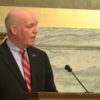Tester votes for debt ceiling deal

Montana’s Democratic U.S. senator stood in favor of the debt deal, which was successfully passed late Thursday. Conversely, all of the Republicans in the state’s congressional delegation voted against the bill aimed at increasing the federal government’s borrowing limit for the next two years.
The House saw a mixed bipartisan response, with a total of 314 representatives supporting the bill and 117 opposing it. Among the opposition, 71 Republicans and 46 Democrats voted against it. In the Senate, the vote resulted in a 63-36 split.
Earlier in the week, Democratic President Biden and Republican Speaker of the House Kevin McCarthy reached an agreement to raise the debt ceiling, implement spending reductions, and introduce changes to work requirements for certain federal programs.
Raising the debt ceiling was necessary for Congress to prevent a default on the federal government’s financial obligations. According to the Washington Post, the threshold has been adjusted 78 times since 1960, but in recent years, it has become increasingly politically contentious.
Montana Democratic Senator Jon Tester supported the measure to raise the debt ceiling. In a late Thursday email statement, he emphasized that defaulting on debts would have severe consequences, such as crashing the economy, erasing Montanans’ retirement accounts, and burdening families and small businesses already grappling with rising costs. Although not entirely satisfied with the bill, Tester acknowledged the bipartisan effort that went into crafting an agreement that invests in veterans’ healthcare and reduces the deficit.
While Tester supported certain aspects of the bill, such as preserving healthcare and benefits for veterans, he expressed reservations about the legislative process involved in reaching the agreement. He also raised concerns about the limit on military spending. However, he did not support amendments to the bill due to potential delays in its passage.
Republican Senator Steve Daines from Montana opposed the deal, citing Washington’s excessive spending as a major concern. He highlighted the national debt nearing $32 trillion and record inflation as critical issues that demand substantial spending reforms. Daines stated that failure to address these challenges would have dire consequences for future generations.
Montana’s U.S. Representative Matt Rosendale took to Twitter after the vote to express his dissatisfaction with the bill, describing it as a “bad day” for America. He considered it an insult to the American people and stated that the citizens of Montana did not send him to Washington to approve a $4 trillion increase in the debt ceiling. As a member of the House Freedom Caucus, Rosendale criticized Speaker Kevin McCarthy and the bill, asserting that it threatened Republican unity and missed an opportunity to safeguard Americans from fiscal ruin.
In a separate statement, Montana’s U.S. Representative Ryan Zinke explained his opposition to the bill, indicating that it fell short of his expectations. While he supported certain components of the bill, such as permit reforms and negotiated spending reductions, Zinke believed that more needed to be done to address Montana’s concerns. He emphasized the importance of cutting the budget and fostering economic growth, drawing upon Article I of the Constitution, which states that money should only be withdrawn from the treasury through appropriations made by law. Zinke expressed the view that the bill, despite respect for those who brokered it, added $4 trillion to the debt and did not align with the fundamental powers outlined in the U.S. Constitution.
ByL Politics406 Staff










